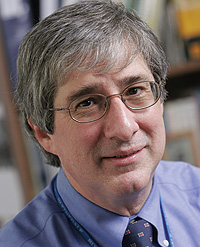FULL STORY
Einstein/Montefiore Center for Autism Receives Major Federal Grant
Funding promotes efforts to diagnose autism at an earlier age
September 18, 2008 — (Bronx, NY) — The Einstein/Montefiore Center for Autism has received a three-year federal grant totaling $600,000 to develop a "Leadership in Autism" training program at its Children's Evaluation and Rehabilitation Center (CERC).
 The grant, from the U.S. Department of Health and Human Services, is one of 21 university and research organization grants awarded nationwide, and the only one in the New York metro area. It was made possible by the Combating Autism Act, enacted by Congress in 2007.
The grant, from the U.S. Department of Health and Human Services, is one of 21 university and research organization grants awarded nationwide, and the only one in the New York metro area. It was made possible by the Combating Autism Act, enacted by Congress in 2007.
Diagnoses of Autism Spectrum Disorders (ASD) have increased nearly tenfold over the past decade. In 2007, the U.S. Centers for Disease Control and Prevention (CDC) released data indicating that about 1 in 150 8-year-old children in the country has ASD. Based on these data, the CDC called autism a "national public health crisis." Creation of the training program will allow the Center to teach medical and allied health professionals to become leaders in the field of ASD.
"Receiving this generous grant is an important breakthrough for us?a major recognition of our efforts," said Dr. Robert Marion, CERC's director and principal investigator. "We can now acquire the staff to take the autism training program from a carefully-designed concept to a functioning reality. This will allow us to expand our efforts to diagnose, combat, and perhaps some day cure autism."
The recently developed Einstein/Montefiore Center for Autism brings together the extensive autism-related activities — clinical, research, training and advocacy — at Albert Einstein College of Medicine and Montefiore Medical Center. These activities include Einstein's Leadership Education in Neurodevelopmental and Related Disabilities (LEND) project and research in the departments of neurology, molecular genetics and neuroscience at both Einstein and Montefiore.
Using state-of-the-art testing methods and evaluation, the Center has been particularly successful at diagnosing ASD at an early age ? as early as  eighteen months, in some cases. Especially for children on the less-severe end of the autism spectrum, early intervention may prevent the disorder from worsening and help the child develop relatively normally. "In order to say that something is or isn't autism, you need to have a familiarity with a full range of developmental diagnoses in a given age group," says Dr. Lisa Shulman, director of CERC's RELATE program and associate clinical professor of pediatrics at Einstein. (RELATE is the acronym for Rehabilitation, Evaluation, and Learning for Autistic Infants and Toddlers at Einstein.)
eighteen months, in some cases. Especially for children on the less-severe end of the autism spectrum, early intervention may prevent the disorder from worsening and help the child develop relatively normally. "In order to say that something is or isn't autism, you need to have a familiarity with a full range of developmental diagnoses in a given age group," says Dr. Lisa Shulman, director of CERC's RELATE program and associate clinical professor of pediatrics at Einstein. (RELATE is the acronym for Rehabilitation, Evaluation, and Learning for Autistic Infants and Toddlers at Einstein.)
The increase in the number of children diagnosed with ASD has overwhelmed programs that diagnose and treat children with ASD. The shortage of such services is perhaps most acutely felt within inner cities. At diagnostic facilities in the Bronx, for example, where the majority of residents belong to minority groups, there are long waiting lists for children who need to be evaluated for possible ASD. Public schools are forced to cope with undiagnosed children, who may not receive necessary treatment.
This grant addresses the urgent need for more trained professionals. It also allows the Einstein/Montefiore Center for Autism to expand its partnerships with other medical providers and community-based organizations, including the Bronx chapter of the Autism Society of America.
###
Other Top Stories
9/11 World Trade Center Exposure Linked to Heart Disease Among NYC Firefighters
On Becoming a Physician: New Einstein Students Receive White Coats and Stethoscopes
Novel Therapy for Acute Migraine Shows Promise in Phase 3 Clinical Trial
First Complete Wiring Diagram of an Animal's Nervous System
Multimillion Dollar NIH Grant to Help Reduce Opioid Use & Get Care to People Who Need It
NIH Grant Funds $23 Million Study of Diseases Affecting People Living with HIV
New TAILORx Data Guides Adjuvant Therapy in Younger Breast Cancer Patients
Einstein Celebrates Its 61st Commencement
Bolstering Biopsies: Testing Patients' Individual Cells to Guide Treatment



Tablet Blog